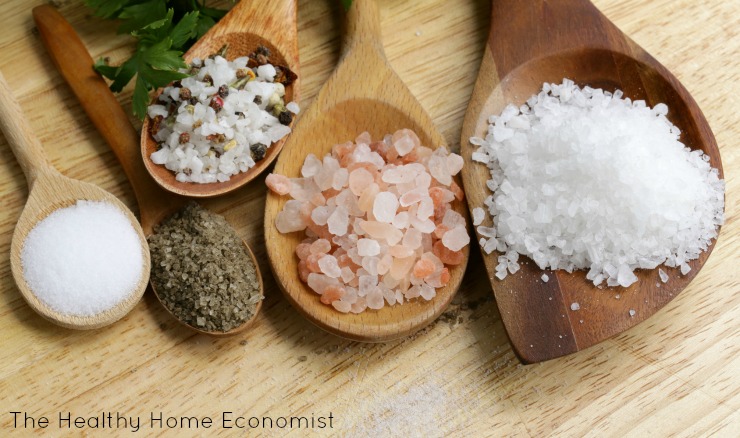Table of Contents[Hide][Show]
 Getting back to basics is the theme for this video, which focuses on choosing a healthy salt to use in your home. Salt has a bad rap these days getting the blame for conditions such as high blood pressure, hypertension, water retention, and bloating, among others. This article explains why you should not fear salt.
Getting back to basics is the theme for this video, which focuses on choosing a healthy salt to use in your home. Salt has a bad rap these days getting the blame for conditions such as high blood pressure, hypertension, water retention, and bloating, among others. This article explains why you should not fear salt.
“Salt” and “sodium” seem to be used interchangeably, but in reality, they are not exactly the same.
“Sodium” is white salt with only 2 minerals in it (NACL – sodium chloride) that is used everywhere and in large quantities in processed foods. It is the result of excessive processing of natural sea salt, which normally contains an abundance of health giving minerals.
THIS is the salt that should be avoided.
Natural Sea Salt is What to Use!
On the other hand, there is natural sea salt.
One of the most popular, Celtic sea salt contains over 80 minerals, including iodine, and is part of a healthy diet. It imparts superior flavor to food and helps normalize all functions in the body that require salt to take place such as protein and carbohydrate digestion, brain development in children, and optimal functioning of the adrenal glands. It is a necessary part of a healthy diet and should not be avoided. It is my opinion (if someone has seen a study on this, please post in the comments section), that people crave salt and eat too much sodium/white salt because they are mineral deficient and in need of natural sea salt with all its beneficial minerals. Use of real sea salt may relieve these salt cravings as the body is finally getting all the trace minerals it needs.
Be wary of highly processed salts on the market advertised as sea salt. If a salt is white, that is your clue that it is highly processed no matter what it is called. Select a sea salt that has color to it, some are even pink! A truly healthy salt will have color indicating the presence of other minerals besides just sodium chloride. Making this change in your home is a critical first step to health. And, if you have already made other changes to your diet for the better but are still using white salt, today is your day to make this change.
Video on How to Choose Healthy Salt
Sarah, The Healthy Home Economist








Thanks for posting about this great deal on Celtic Salt, Melissa.
I checked the salt I just picked up at our health foods store and- it WAS Redmond RealSalt!!! I was so excited that I had chosen the same one you recommended. 🙂 I remember you saying (I think here on the blog) that sea salt should be colorful- and not white- if it was true sea salt… so I picked it for it's color and midrange price. SO glad to know that my choice was a good one! 🙂 Thanks again for all your awesome information!
Thanks for the great tip about the fleas! That's an interesting point you have about using the white salt as a body exfoliator. I would be more worried about the additives in it than the sodium chloride being a problem on the skin. Thanks for the thought provoking comment.
Another use for processed salt is to kill fleas in carpets or on furniture. Shake over area, leave 24 hours, then vaccuum.
I would NOT use it as a salt scrub because your skin absorbs as much as 60% of what is put on it. The same minerals that are great for you internally are also great as a salt scrub. JMHO.
Thanks for more great nutritional information.
Hi Jennifer, the only source of real sea salt in North America is in Utah, from what I know. Salt has not traditionally been a locally produced commodity, hence the highly profitable salt routes of centuries past. I think good quality sea salt is one item that is understandable to not buy locally if it simply isn't available.
Just checked my Redmond RealSalt and it is kosher certified!
I am trying to be a local food fighter, and salt is difficult…do you know of any other sources for salt around the U.S., besides Utah? I'm in Georgia.
It is my understanding that the term kosher refers to how a food is handled/processed (assuming the food is an acceptable kosher food to begin with, which salt would be). As a result, there are probably some highly processed salts that are considered kosher that would not be a healthy choice. There are also probably unprocessed sea salts that are certified kosher as well. These would be the ones to seek out.
What about kosher salt?
Thanks for a great blog! 🙂
Thanks so much for the videos and the good information you regularly give us. I have made a lot of changes based on your recommendations. You make it easy. Thanks again